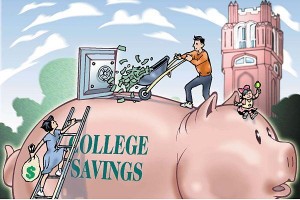How to do Saving for Your Education
 Saving for education is the most important form of saving as the future of the child depends upon it. It ensures that the education is not sacrificed because of lack of money.
Saving for education is the most important form of saving as the future of the child depends upon it. It ensures that the education is not sacrificed because of lack of money.
Higher education is getting expensive these days and people are finding it difficult to pay for it easily. One can manage to afford their higher education if they set aside some money and build savings for the same. If you start saving early, you can start with smaller amounts and eventually save a lot in the end. The savings you do will add up compound interest giving you a considerable amount of profit by the time you join a college. You do not even need to ask someone for money once you have your own savings.
One must look for regular saving goals so that the amount of savings is added up to fund the education. You must plan for your future so that you do not have to leave a college just because it is difficult for you to afford it. In order to save enough amount of money, you can also take the help from the automatic electronic transfers where a particular amount is deducted from your paycheck every month and is deposited in an account where your savings for the education is there. This helps you save a considerable amount of money when you are planning to save for your education or for some other financial goal.
When you make an online account of the bank to do the savings, you must add a nickname to the account and mention the name of your children or grandchildren. The online banking is carried on smoothly this way and is helpful if you are trying to save. These online accounts also send you reminders if you miss your payments and you know what are you saving for and for whom are you doing so.
If you are a parent, and are saving for your child’s education, then you must ask your child to save for his education from his allowance too. This can be started at an early age as it teaches the children to save and manage finances. The sense of responsibility is there in children and it is easier for them to realize the financial condition at an early age. The children also tend to be a little proud of them because they have contributed to their education from their own savings.
For the ones who want to save some money for the education has many options so that they can save easily. Several plans and accounts that are offered to the people and they use them to deposit their money in that. There are certain eligibility criteria and limits on the contributions made in these accounts and so, one should contact a professional and clear all the doubts before taking one. You can know about the terms and conditions along with the fees involve and assess whether it is meant for you or not. Irrespective of which type of plan you go for, funding for education is a very important thing and one must start doing that early so that the education is not compromised because of lack of funds.
When the students move out if home and start living away from home, they tend to make their own financial decisions and learn how to manage their finances. They start learning how to do so over time and become quite smart about their approach. There are certain ways that help them manage their finances when they are away from home:
Checking Account: One can open a checking account in case the electronic transfers or purchases are to be made. The deposit and the withdrawal of money become easy when one has a checking account. The ones who have a debit card can shop around with it just as if they do while shopping with cash. The fees and the charges associated with the card should be read properly and then it should be signed up.
Ways to Save: The students can also open a saving account that will help them save and earn interest on the money at the same time. They can help the student to save the tuition fee or the money required for the textbooks. Emergency monetary requirements can also be met with the help of these savings.
Student Credit Card: There are student credit cards that are offered to the students so that they can build their credit histories and can manage their finances at an early age. They learn how to handle the responsibility of a credit card and avoid overspending.












